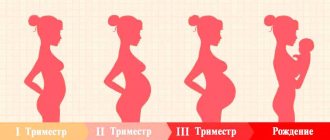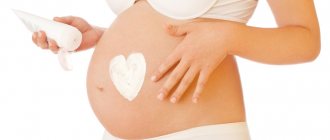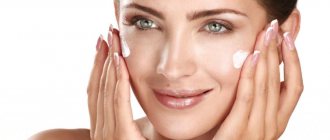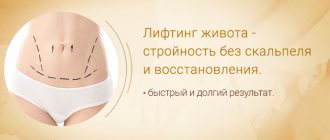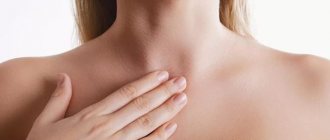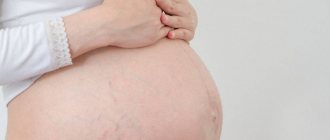Skin changes during pregnancy
During pregnancy, the female body invariably changes.
What physiological skin changes occur during pregnancy?
During pregnancy, under the influence of hormones, the skin around the nipples and in the genital area becomes darker and a dark line (Linea nigra) appears in the middle of the abdomen.
During the period of intrauterine development of the fetus, due to the tension of the skin, purple and pink stripes (lines), the so-called stretch marks, may appear.
Some women experience the development of age spots on the face (melasma).
Could these phenomena be temporary? Can they be treated?
Some physiological phenomena may resolve on their own after delivery (such as pigmentation around the nipples and a dark line on the abdomen). Others persist, although less pronounced, for a long time (styria). Pigment spots can be eliminated with special whitening creams. Unfortunately, creams against the appearance of stretch marks practically do not work. There are various techniques that reduce optically noticeable stretch marks that can be used after childbirth (laser resurfacing, mesotherapy procedures, plasma lifting procedures).
During pregnancy, some diseases may occur that are observed only in the given physiological state of the woman and usually resolve after childbirth.
polymorphic dermatitis of pregnant women.
This itchy dermatosis develops, according to various sources, in 1 in 300 pregnant women.
The rash usually begins on stretch marks in the abdomen and can spread to other parts of the body.
This disease is not dangerous to the fetus and usually resolves completely within 6 weeks after birth.
It is extremely rare that this dermatitis develops after the birth of the baby, but completely resolves after 6 weeks.
Bullous pemphigoid of pregnancy - BPP (herpes of pregnancy) is a rare autoimmune disease with the formation of blisters on the skin, observed during pregnancy and the postpartum period. In some sources, this disease is usually described under the term “herpes of pregnant women,” although it has nothing to do with herpes infection. As a rule, it begins with the appearance of small bubbles in the navel area with further spread to other parts of the body.
There is no evidence for the development of a serious risk for the newborn, although in 5-10% skin lesions in newborns are noted in the form of a transient urticarial and vesicular rash, which spontaneously disappears within 3 weeks.
These diseases can be successfully treated. The doctor selects therapy according to standards and prescribes drugs with minimal risk to the mother and fetus.
Diffuse hair loss during and after pregnancy also occurs - Telogen effluvium, which usually lasts from 3 to 12 months after childbirth and resolves on its own without any treatment. Such hair loss after the birth of a child is normal and, according to the European Association of Dermatology, treatment with special shampoos or other drugs during this period is not effective.
It is very important to inform the doctor about any changes on the skin during pregnancy and not to self-medicate, since in addition to the usual and expected changes on the skin during pregnancy, the rash can be a manifestation of dangerous diseases for the mother and child (syphilis, rubella, chicken pox, genital , herpes simplex and herpes zoster).
Khramtsova Yu.S.
Allergies and pregnancy: myths and reality
For many women, pregnancy is not only a long-awaited joy, but also a cause for concern. The information space is replete with articles about a variety of risk factors. Some of which really require attention, while others are nothing more than a myth.
The “danger” of allergies in a pregnant woman for the health of the fetus is one of the common causes of concern. How much concern is justified? Let's figure it out.
Myth No. 1: exacerbation of allergies during pregnancy - the risk of “allergization” of the child
The mechanism for the development of an allergic reaction is identical to that for any inflammation. Foreign object – production of antibodies – binding, removal and destruction of antigen – recovery.
In the case of allergies, class E antibodies serve as such “protection”, and some elements of the environment or food serve as a foreign object. Produced by the body after the first encounter with an “unpleasant” object, IgE is stored in the blood as “memory” cells and instantly initiates an “attack” (the release of histamine and similar substances) upon repeated encounter with the allergen.
However, due to their large size, class E antibodies are not able to penetrate the placental barrier, and the point of application of histamine and similar substances is only the “target” tissues of the allergic person (skin, respiratory tract and conjunctiva). Thus, neither IgE nor the “products” of its activity are capable of having any serious effect on the fetus.
Myth No. 2: Pregnancy causes an exacerbation of allergies.
Pregnancy is known for some “muffled” immune processes. Without a relative decrease in protective forces, the fetus would be rejected as a foreign object, but thanks to adrenal hormones this does not happen.
Normally, cortisol levels in a pregnant woman remain elevated until delivery. This weakens the reactivity of her immune system, not only against microorganisms, but also allergens, allowing her to “rest” from unpleasant allergy symptoms.
However, in approximately 10-30% of expectant mothers, allergies still make themselves felt. This may be due to a number of reasons, including genetic characteristics of the immune and hormonal status.
Myth No. 3: A blood test can predict possible allergies.
A general immunoglobulin E blood test serves to confirm the allergenic nature of existing symptoms and cannot be a risk marker.
Skin allergy tests can help predict the development of an allergic reaction in advance. The study involves applying allergens to a previously “scratched” area of skin with further assessment of the reaction. True, skin tests are not recommended during pregnancy, and the tests themselves can be false negative, due to the “work” of cortisol. While testing blood for class E antibodies to a specific allergen has no contraindications, and the high sensitivity of the test allows you to detect even the most minor changes. The level of immunoglobulin E to the allergen shows the level of “sensitization” - the body’s possible sensitivity to the allergen.
It must be said that to confirm the diagnosis, in combination with IgE, a general blood test with leukocyte count (focus on eosinophils) and eosinophil cationic protein (for hay fever) are indicated.
Obtaining increased values in the results is a justification for further examination, aimed either at searching directly for an individual allergen, or identifying a reaction to a specific group.
It is worth noting that the presence of an allergy comes as a “surprise” for some, since in a mild form the symptoms may be no different from skin diseases, acute respiratory viral infections, and even food intolerance. And due to the complex structure of some allergens, hypersensitivity, for example, to birch, manifests itself in a reaction when eating peaches.
Thus, an allergy as such is not capable of harming the fetus, normally should not appear during pregnancy, it is not possible to predict its occurrence, and a simple and effective blood test can help determine the existing reactivity.
Itchy hands during pregnancy: eliminating the causes
Skin itching in pregnant women can be both a natural reaction of the body to the current situation, and a symptom of some serious abnormalities. In any case, you should consult your doctor about this.
To alleviate the unpleasant condition when your arms, fingers, and palms itch during pregnancy, you can follow these recommendations:
- Proper care of the skin of your hands and entire body should begin from the very beginning of pregnancy. Then you will be able to avoid increased dryness and flaking of the skin.
- For care, it is better to use products marked “hypoallergenic”; if allergic symptoms appear, you should temporarily abandon decorative cosmetics and try not to come into contact with chemicals and irritants.
- Watch your diet, eat properly and balanced.
- Drink enough clean water to replenish the lack of fluid in the body.
- Try to avoid stressful situations, get more rest and relaxation, walk in the fresh air, and provide gentle physical activity (after consulting a doctor).
- If itching persists for a long time and other symptoms appear, immediately inform your doctor.
Clinical researches
The effectiveness, safety and tolerability of La-Cri products have been clinically proven. The products are recommended by the Union of Pediatricians of Russia. During clinical studies, specialists were able to record that the La-Cri cleansing gel:
- gently cleanses the skin;
- relieves redness and itching;
- restores and nourishes the skin.
Cream for dry skin "La-Cri" eliminates dryness and flaking, retains the skin's own moisture, and also protects it from wind and cold.
Lip balm La Cree:
- relieves the feeling of discomfort and dryness;
- restores dry and cracked lips;
- moisturizes and protects the skin from wind and cold.
Sources:
- Sukolin Gennady Ivanovich, Illustrated clinical dermatology. Brief alphabetical reference book, Lux Print publishing house, 2010.
- Schneiderman Paul, Grossman Mark, Differential diagnosis in dermatology. Atlas, Binom, 2022.
- Reken Martin, Schaller Martin, Sattler Elke, Burgdorf Walter, Atlas of Dermatology, MEDpress-inform, 2022.
Photos of eczema
Photo album on the diseaseCosmetics La Cree - an assistant to the expectant mother
The La-Cri series is a non-hormonal anti-inflammatory product with a natural composition for the care of skin prone to itching. They are sold in pharmacies and do not contain hormones, fragrances, dyes, silicones and parabens.
The complex composition, including natural components, effectively affects all manifestations of skin inflammation: redness, itching, irritation and peeling. Thanks to its safe composition, La-Cri products are approved for use when hands itch during pregnancy.
